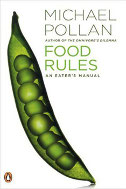
Title: Food Rules: An Eater’s Manual
Author: Michal Pollan
Source: Veddma library
ISBN: 978-0-14-311638-7
Available online
Notes: Michael Pollan argues that any traditional diet is better than what has “evolved” to be the Western diet, high in “edible foodlike substances” and lacking real foods. Most of the research has been described in other books of his, such as “Omnivore’s Dilemma”, whereas this book is a collection of “food rules”, expanding Michael Pollan’s directive of “Eat food. Not too much. Mostly plants.”. The book consists of 3 parts, each part providing ways to step away from the Western diet. The first part covers more obviuos tips on eating real food and removing processed foods from one’s diet. The second part goes a little deeper into what makes for good food (grown in rich soil, unprocessed, perishable, etc.). The third part provides tips on limiting portions.
The author addresses a few “old wives tales” that correspond to scientific findings, although he does admit that the nutritional science is way too young to clearly define best nutritional components. However, he argues that certain things are very clear from reviewing the research done until now. Most of them are plain and somewhat obvious, but adhering to them would lead one to a better relationship with food. This in contrast with trying to find one “evil” ingredient in modern diets so that processed food industry can adjust for that one ingredient (say, fat) by compensating with other unhealthy ingredients (say, sugar) and declare their products nutritious.
Here are a few tips I found worth noting (combining some similar ones):
- Do not eat anything that contains unpronounceable ingredients, anything your great-grandmother wouldn’t recognize as food, anything with more than 5 ingredients, or where one of the top 3 ingredients is some form of sugar (no matter if it’s high fructose corn syrup, aspartame, cane sugar, fructose, or something else)
- Avoid food products that use words like “low fat”, “non-fat”, “lite”, or make health claims: only large food processing corporations have such an advertising budget – produce has no health claims
- Avoid imitation foods or most foods advertised on TV
- Shop at a farmer’s market, buy food that will eventually rot
- Eat only foods cooked by humans, and not in a facility where everyone must wear a surgical cap
- It is not food if it arrives through the window of your car or if it has the same name in every language
- Eat mostly plants, in a variety of colours (each colour signals different phytochemicals the combination of which is optimal), drink the water the vegetables were boiled in
- Treat meat as a special occasion food (I’m not sure I agree on this one) – use it sparingly, eat animals that themselves have eaten well, eat wild foods and oily little fishes (mackerel, sardines, anchovies)
- Eat well-grown food from a healthy soil, grow food yourself, try new species of food (plant and animal)
- Buy in bulk on sale in season and store food in a freezer
- Eat fermented foods (kefir, real soy sauce, kimchi, yogurt, sauerkraut, and sourdough bread)
- Eat sweet foods as found in nature, sweeten and salt food for yourself
- Eat oils and breads than have traditionally been stone-ground, avoid white breads
- Treat treats as special occasion food, eat junk food only if you make it yourself (that tends to limit junk food consumption since its preparation is very time-consuming)
- Eat a traditional diet, have a glass of wine with dinner
- Pay more eat less, stop before you are full, eat when hungry, eat slowly
- First bite is better than each subsequent one
- Take as much time to eat the meal as it took to cook it
- Use smaller containers and don’t go back for seconds
- Eat most of the food at breakfast, less at lunch, and least at dinner (this one really bothers me: most of us who are working don’t have time for a long breakfast or lunch, and many people, including Michael Pollan, sing the praise to family meals, which for most of us is dinner – so we are supposed to eat very little at a meal when everyone finally gets together at the family table, and for which meal there is actually some time to prepare?)
- Eat meals, limit snacks, if eating not at table snack on vegetables of fruit
- Don’t eat where your car gets your fuel (I really like this one – gas stations do not sell real food)
- Leave something on your plate (I don’t agree with this one either: just don’t put things on your plate that you are not planning to eat. Wasting food is not a good solution.)
- Cook, as then you have the most control over what goes into your food
Overall a good read full of common sense, and certainly a nice break from the dogmatic nutritional advice that is assaulting us from every direction these days.





